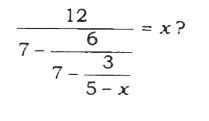A polynomial P(x) with integral coefficients takes the value 5 at four distinct integral values of x. The number of integral solutions of the equation P(x)−3=0 is ________________
The correct Answer is:0
To solve the problem, we need to analyze the polynomial P(x) given that it takes the value 5 at four distinct integral values of x. We will denote these four distinct integral values as α1,α2,α3,α4.
1. Understanding the Polynomial:
Since P(x) takes the value 5 at four distinct integral values, we can express this as:
P(α1)=5,P(α2)=5,P(α3)=5,P(α4)=5
2. Constructing a New Polynomial:
We can construct a new polynomial Q(x)=P(x)−5. This polynomial Q(x) will have roots at α1,α2,α3,α4:
Q(x)=(x−α1)(x−α2)(x−α3)(x−α4)⋅R(x)
where R(x) is some polynomial with integer coefficients.
3. Finding the Equation:
We want to find the integral solutions of the equation P(x)−3=0. This can be rewritten using Q(x):
P(x)−3=0⟹Q(x)+2=0⟹Q(x)=−2
4. Analyzing the Roots:
The polynomial Q(x) is a polynomial of degree at least 4 (since it has 4 roots). The equation Q(x)=−2 can have multiple solutions.
5. Finding the Number of Solutions:
Since Q(x) is a polynomial of degree at least 4, it can cross the line y=−2 at most 4 times, depending on the behavior of the polynomial. Therefore, the number of integral solutions to P(x)−3=0 can be at most 4.
6. Conclusion:
Since P(x) takes the value 5 at four distinct integral values, and we are looking for the number of times P(x)−3=0 can occur, the maximum number of integral solutions is 4.
Thus, the number of integral solutions of the equation P(x)−3=0 is 4.
Since P(x) takes the value 5 at four distinct integral values, we can express this as:
P(α1)=5,P(α2)=5,P(α3)=5,P(α4)=5
We can construct a new polynomial Q(x)=P(x)−5. This polynomial Q(x) will have roots at α1,α2,α3,α4:
Q(x)=(x−α1)(x−α2)(x−α3)(x−α4)⋅R(x)
where R(x) is some polynomial with integer coefficients.
We want to find the integral solutions of the equation P(x)−3=0. This can be rewritten using Q(x):
P(x)−3=0⟹Q(x)+2=0⟹Q(x)=−2
The polynomial Q(x) is a polynomial of degree at least 4 (since it has 4 roots). The equation Q(x)=−2 can have multiple solutions.
Since Q(x) is a polynomial of degree at least 4, it can cross the line y=−2 at most 4 times, depending on the behavior of the polynomial. Therefore, the number of integral solutions to P(x)−3=0 can be at most 4.
Since P(x) takes the value 5 at four distinct integral values, and we are looking for the number of times P(x)−3=0 can occur, the maximum number of integral solutions is 4.
Topper's Solved these Questions
- TIPSBOOK - FIITJEECHAPTER - TIPSEXERCISE - NUERICAL DECIMAL BASED QUATIONS
20 Videos
- TIPSBOOK - FIITJEECHAPTER - TIPSEXERCISE - PARAGRAPH BASED (MULTIPLE CHOICE) (COMPREHENSION - I)
39 Videos
- TEST PAPERSBOOK - FIITJEECHAPTER - TEST PAPERSEXERCISE - MATHEMATICS
328 Videos
- TRIGNOMETRIC RATIOS AND IDENTITIESBOOK - FIITJEECHAPTER - TRIGNOMETRIC RATIOS AND IDENTITIESEXERCISE - All Questions
1 Videos
Similar Questions
Knowledge Check
The number of integral solutions of x2−3x−4<0, is
A3B4C6Dnone of theseThe number of non- negative integral solutions of the equation x+y+z=5 is :
A20B19C21D25The number of integral values of x satisfying the equation |x−|x−4∣∣=4 is
A5B7C9Dinfinite
The number of non- negative integral solutions of the equation x+y+z=5 is :
View SolutionThe number of integral values of x satisfying ∣∣x2−1∣∣≤3 is
View SolutionThe number of integral values of x satisfying 5x−1<(x+1)2<7x−3 is
View SolutionThe number of integral values in the solution set ofthe inequation |x−1|+|x−2|+|x−3|<0 is
View SolutionThe number of positive integral solution of the equation x1x2x3x4x5=1050 is
View Solution

